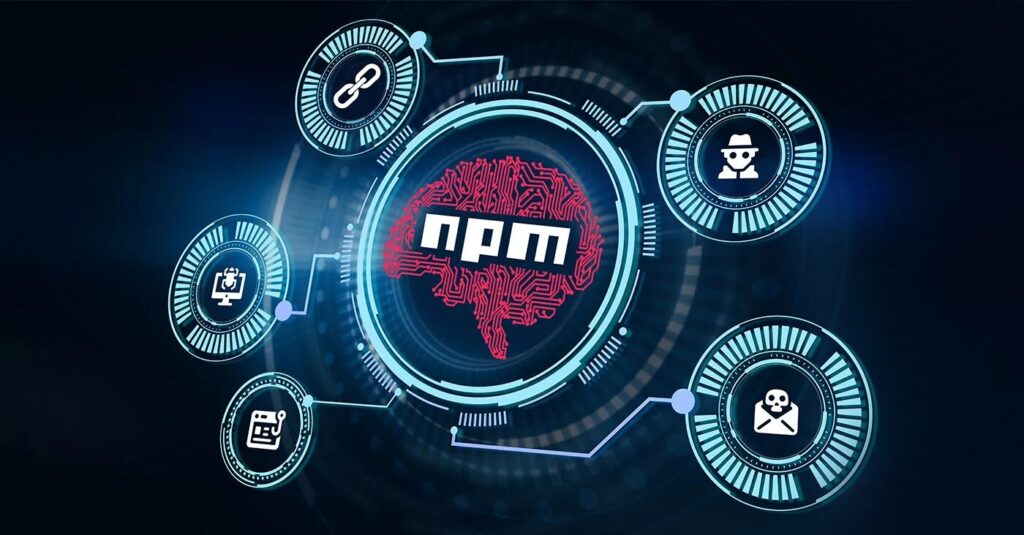A new malware attack is hitting the crypto world hard. Hackers have found a way to use compromised NPM packages to steal Ethereum (ETH), XRP, and Solana (SOL). This campaign quietly infects systems and reroutes user transactions to wallets controlled by attackers.
How the Attack Works

The hackers are hiding their code in fake but convincing NPM packages. One such package, “pdf-to-office,” looks harmless. But once installed, it digs into your system, scans for crypto wallets like Exodus and Atomic, and silently waits for activity.
When the user initiates a transaction, the malware jumps in. It grabs the address you meant to send to and replaces it with an address owned by the attacker. Everything else looks normal, so victims rarely notice until it’s too late.
It Targets Multiple Wallets and Blockchains
This isn’t a one-coin attack. The malware can hijack transactions across Ethereum, Solana, Tron-based USDT, and XRP. It watches clipboard activity, which means that even if you’re manually copying and pasting an address, it can intervene.
And it’s not just retail investors being targeted. Developers are especially vulnerable. Since they often work with NPM packages, they’re the perfect entry point.
Obfuscation Makes It Harder to Detect
What makes this threat worse is how well-hidden it is. The malicious code is buried deep in files that look like harmless scripts. It also uses obfuscation to keep security tools from flagging it. Even careful users might miss it.
Developers might think they’re using a helpful tool, when in fact, they’ve handed access over to a malicious actor. This is how the malware stays in the system and continues redirecting funds for long periods.
Similar Attacks Are On the Rise
This type of software supply chain attack isn’t new. But it’s becoming more aggressive. In previous incidents, attackers used GitHub, PyPI, and other package managers to spread malicious tools.
Blockchain developers are frequent targets. In one case, a dev was tricked into downloading malicious code during a fake job recruitment. Within minutes, their MetaMask wallet was drained.
Another report highlighted a fake job interview scheme where devs were told to test buggy software. The “bugs” were actually malware scripts.
What You Can Do to Stay Safe

This kind of malware is tricky, but not impossible to stop. The key is good habits and the right tools.
- Only use trusted NPM packages. Check the download counts, reviews, and history. If something looks new or has little activity, avoid it.
- Use endpoint protection. Security software that scans for suspicious scripts can catch malware before it executes.
- Keep wallets secure. Store them offline when not in use. Use hardware wallets for larger amounts.
- Avoid clicking unknown links or accepting random job offers. Be cautious about where you get your code or collaborate.
- Educate team members. One weak link is all it takes. If one person downloads a malicious package, the entire network could be compromised.
The Crypto Space Needs Stronger Defenses
Attacks like these are a wake-up call. The crypto world moves fast, but security often lags behind.
We’re seeing a trend: as decentralized finance grows, so do the threats against it. Developers need better tools to vet packages, and users need more secure wallets that can detect transaction tampering.
Even a clipboard monitoring feature could help stop this type of attack. Right now, many wallets don’t offer that.
Final Thoughts
The malicious NPM package campaign shows just how easy it is for hackers to exploit a weak spot. One fake script can lead to thousands in losses.
The line between development tools and crypto assets is thinner than ever. And with more people entering the space every day, the risks are growing.
Don’t assume that just because something looks like an official tool, it’s safe. Stay alert, verify everything, and protect your funds like your future depends on it—because it just might.
Disclaimer:
This article is for informational purposes only. It does not provide financial or cybersecurity advice. Always do your own research before investing or using software related to cryptocurrency.




